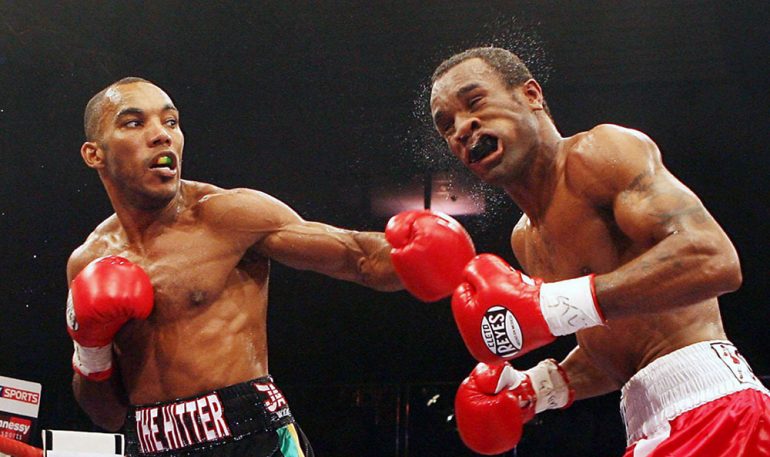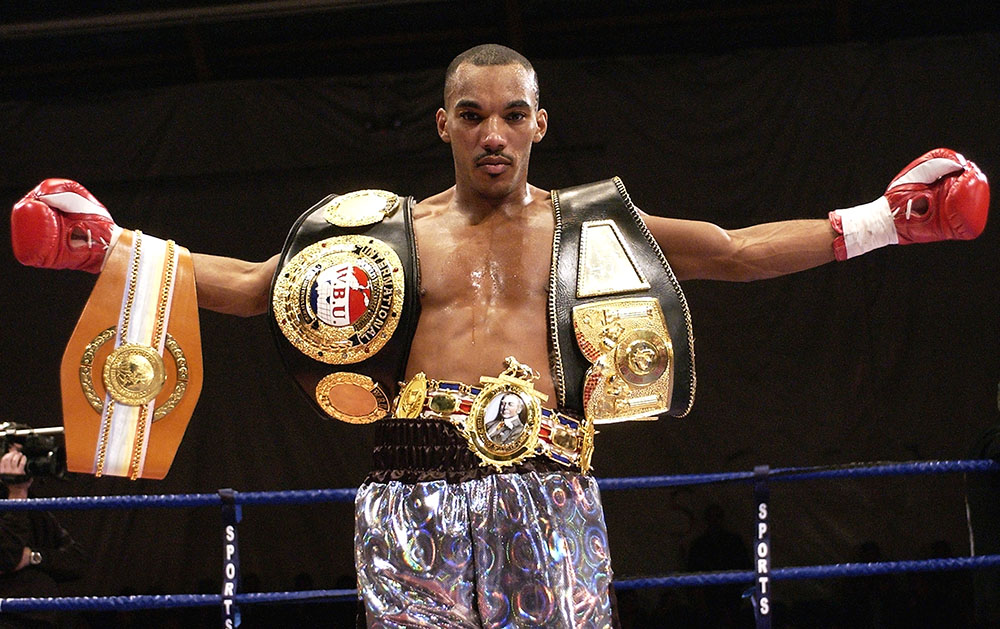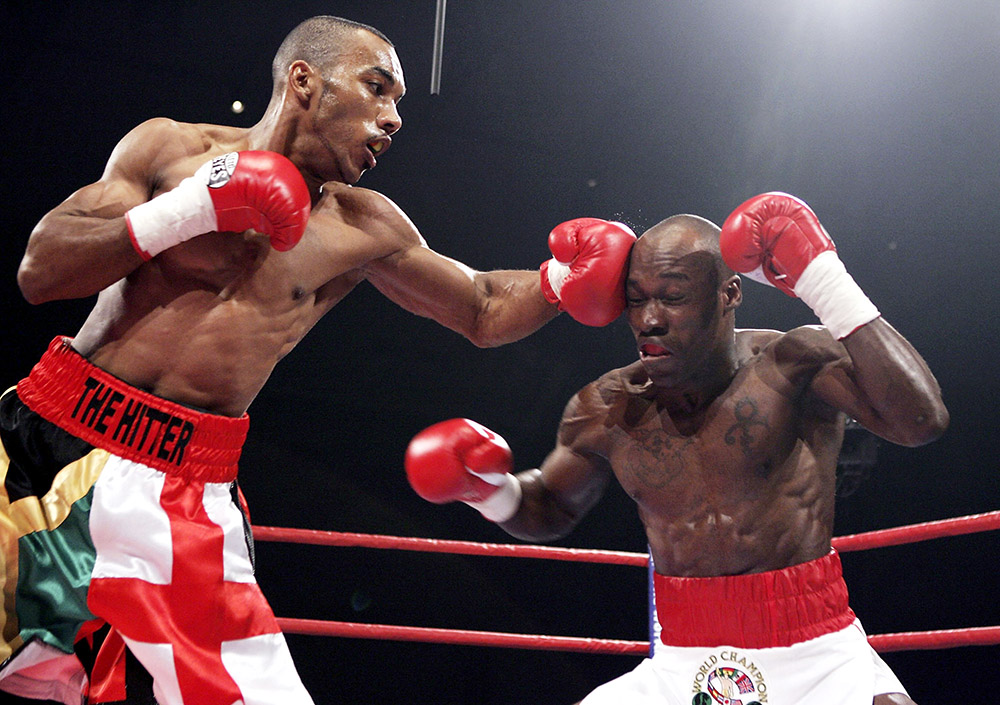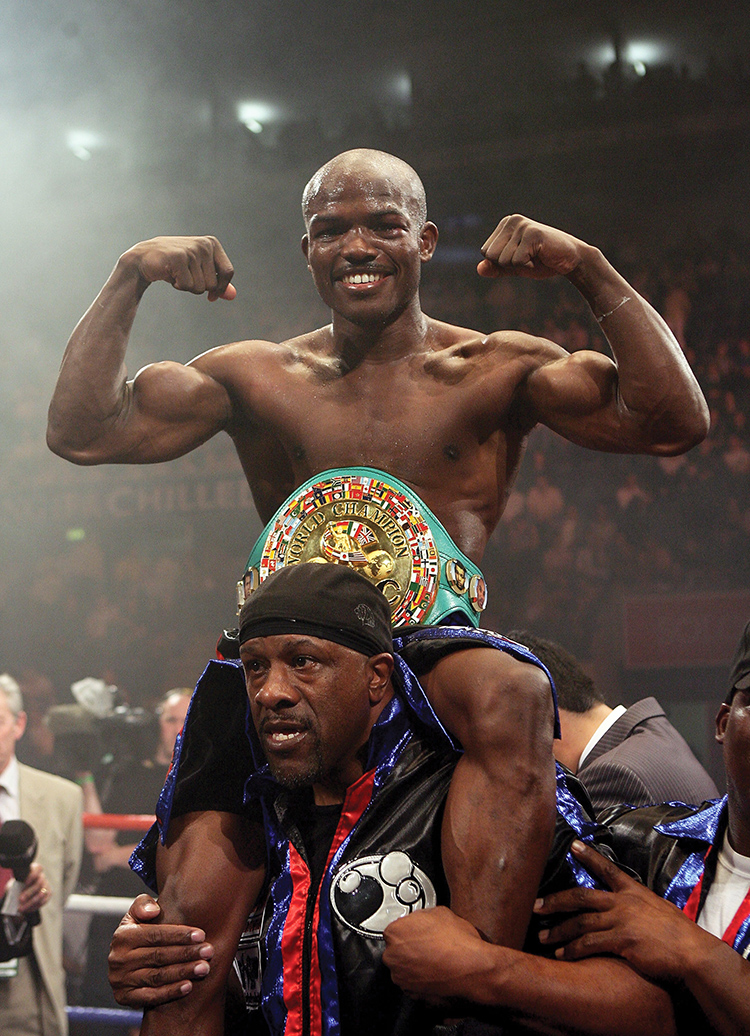Best I Faced: Junior Witter

Unorthodox switch-hitter Junior Witter went the traditional route, winning the British, Commonwealth and European titles before claiming the WBC junior welterweight crown in the mid-2000s.
Witter, who is of Jamaican heritage, was born in Bradford, England, on March 10, 1974.
“I’m from a working-class background. My mum and dad worked together at a nightclub,” Witter told The Ring. “I grew up a nice, happy lad in my own world.
“We didn’t go through proper hardships. My mum and dad’s business was doing all right and we had stuff. We weren’t poor, but we weren’t rich by a longshot either.”
A school friend first introduced Witter to boxing when he was 11 years old. He enrolled in a six-week training course and at the end of it decided to enter the Bradford Championships. Although he was a relative novice, he reached the final.
It was just the confidence booster he needed, and he quickly progressed. He later won the junior ABAs and boxed for Young England before later claiming a national title. His amateur record was 80-40.
After leaving school, Witter became a computer repairman. Within a year, he found himself unemployed and worked a couple of dead-end jobs before deciding to turn professional under the watchful eye of Brendan Ingle in January 1997.
“It was one of those things I thought I’d like to do it, but it wasn’t something I thought, ‘That’s what I’m going to do,”‘ said Witter of his decision to turn professional at 23. “I caught Brendan’s attention years before; I boxed three of his kids when I was amateur. When I decided I was going to turn over, I just walked into the gym and that was it. Our styles gelled and that was it. The trainer/coach relationship was perfect.”
“I never turned down a fight. Never scared of anyone. Never ran away from a fight.”
Witter’s debut didn’t work out as planned and he had to settle for an unsatisfactory six-round draw. However, he remained unbeaten in his early career despite often fighting more-favored fighters on the road.
In April 1998, on three days’ notice, Witter was offered a fight with big-punching former world title challenger Jan Bergman (35-1 with 27 knockouts at the time) on the undercard of Ingle stablemate Naseem Hamed vs. Wilfredo Vazquez.
“I knew [Bergman’s] record. I thought, ‘I know he’s done that to them, but he’s not doing it to me,”‘ said Witter, who shocked the IBF No. 2-ranked 140-pounder by taking a six-round decision. “I went in and boxed around him. He caught me with one punch throughout the whole fight. I thought, ‘I don’t need to go to war with this guy.’ I’m cruising the fight, pot-shotting and moving around him, and won comfortable.”
Despite the win, Witter didn’t get the credit he deserved and returned to fighting on small hall shows.
Two years later, Witter received an offer to step in on nine days’ notice to replace British champion Jason Rowland against the precociously talented IBF junior welterweight titlist Zab Judah.
via David Kirkwood on YouTube:
“It was a shot in the dark. Realistically, it was too soon,” admitted Witter, who gave a good account of himself in losing a 12-round unanimous decision. “I hadn’t had the build-up that I needed to teach me what I needed to know for that fight. Sometimes you’ve just got to take the gamble. It taught me loads; learnt from it. It was a massive part of my career and a massive part of who I became as a fighter, as in believing in my skills and ability.”
A more confident Witter emerged. He won his next 15 fights, all inside the distance, claiming the British, Commonwealth and European titles.

Witter in 2002. (Photo by John Gichigi/Getty Images)
Witter then dipped his toe back into the world-class scene and gained valuable seasoning in beating future world champions Lovemore Ndou (UD 12) in Los Angeles, followed by Andriy Kotelnik (UD 12) in Nottingham.
Those wins helped install Witter as the WBC mandatory challenger to Floyd Mayweather Jr.
“I’d been mandatory challenger for nine months and the fight had to be made, and he moved up,” explained Witter, who spent 11 months on the sidelines waiting for his second world title shot. “Do I think he avoided me? Yeah, I do think he avoided me. I don’t think it’s 100 percent about being scared of me, but he avoided me because he thought, ‘I’ve got an easier route which I can sell better in America and make more money.'”
Witter was instead matched with DeMarcus “Chop Chop” Corley to fill the title vacancy at the famous Alexandra Palace in London on September 15, 2006.
“It was a good night, because I won and I was on top the whole fight,” said Witter, who won a 12-round unanimous decision. “I remember clipping him with a shot and he went back into a shell. I remember him tucking up tight and wouldn’t come out of his shell to have a go. I’m leaving him half opportunities to have a go, and he wouldn’t after that. He seemed scared of the power.”

Witter vs. Corley. (Photo by John Gichigi/Getty Images)
The new champion turned back Arturo Morua (TKO 9) and former WBA titlist Vivian Harris (KO 7) in title defenses.
“When you look at Vivian Harris, everyone was scared of him,” said Witter. “No one wanted to fight. He’d been champion; he had a blip when he lost it. He came back strong, and he was the favorite for that fight with me. I just thought, ‘I’m going to show what I can do.’ I dropped him again, and by Round 7 the fight was over. He was never the same again after that fight.”
via ovnilol on YouTube:
All the while, the fight Witter craved the most was an all-British showdown with Ricky Hatton.
“There’s a few points throughout my boxing career where that fight made a lot of sense,” he said. “When it first got talked about, it would have made good money, [but after more time had passed] it would have made ridiculous money. The interest was there from the British public. It would have sold and made a lot of money, but when one person doesn’t want to fight, boxing’s not like other sports where you play whoever’s in your league. There are ways around fights, unfortunately.
“When you get to a certain stage in your career, you are the man in charge. You are a celebrity and what you really want will happen, and he didn’t want it. If you truly believe you are the best, you’ve got someone who is a thorn in your side and you can’t get away from him throughout your whole career. If you believe you are what you are what you said you are, you’re a man of your word; you do the fight, you shut him up. There was plenty of opportunity for that fight to happen.
“I’ve seen [Ricky] loads of times, but he just doesn’t talk about. He just avoids the whole area of me and him fighting and then just switches the conversation to something else.”
Witter was next tasked with facing unheralded mandatory challenger Tim Bradley. The unbeaten American came to Nottingham in May 2008.
“It’s the only fight I never wanted to be in the ring,” said Witter. “My dad got cancer in January. First they were going to operate, then they didn’t, and he started his chemotherapy on the Thursday before the fight.
“At the end of the day, I got in, I boxed, I was fine. One punch changed the fight, in reality. Ninety-nine times out of 100, I just slip out of the way of that shot. I think he did what he had to do. I do respect him. He came out and fought his fight. For someone on that level to just creep by me, in my eyes, I’m looking and thinking that’s how good I was.
“The WBC heard about my dad and they said, ‘We’ll do the rematch,’ and he vacated rather than box me.”

Tim Bradley celebrates his win over Junior Witter in Nottingham. (Photo by John Gichigi/Getty Images)
Tim Bradley on fighting Witter:
“I watched Junior Witter late at night just to find a weakness, because I knew someday I was going to face him. And I did that for a year straight. I drove my wife mad, because she would wake up and I’m up at 3 a.m. watching Junior Witter fight.
“It wasn’t for a while before I really found a weakness. He was a tricky fighter. He was a switch-hitter; he had power in both hands. He had really good speed. He had great reflexes. He threw punches at the oddest angles – he was very creative with his offense.”
Witter was matched with rising young star Devon Alexander for the vacant title in Rancho Mirago, California, in August 2009.
“The weight was really telling on me,” said Witter, who retired with a hand injury at the end of the eighth round. “I didn’t have the knowledge, how traveling affects your weight. It’s absolutely killing me. Flying and the way it affects your weight, and we as a team weren’t prepared for that.”
After an 18-month hiatus largely due to having an ACL replacement, Witter returned up at welterweight. However, he had to travel to Canada to face Victor Lupo Puiu and dropped a decision. In an attempt to jump-start his career, Witter fought in the Prizefighter 19 welterweight tournament but lost in the final to Yassine El Maachi.
Witter was able to claim the British welterweight title, but controversial losses on the road in Germany and France left him disheartened. Unable to secure another fight, he walked away with a record of 43-8-2 (23 knockouts).
Witter, now 49, is married, has two stepchildren and lives in Rotherham. He runs a boxing gym and owns a company called Switch Hitter Customs that customizes boxing boots. There is a book being written about him called The Avoided.
“I overachieved on my dreams,” he said. “My dream was the British title. On a good night, I was absolutely brilliant; on a poor night, I was average. I’d achieved everything realistically I could achieve. I never turned down a fight. Never scared of anyone. Never ran away from a fight.”
He graciously took time to speak to The Ring about the best he fought in 10 key categories.
BEST JAB
Devon Alexander: “The jab was sharp and accurate. It lasted throughout the fight and was consistent and didn’t dip.”
BEST DEFENSE
DeMarcus Corley: “He moved and he was very defensive with what he did. I probably landed one really good shot in the fight. He was too much in his shell; he tucked up really well. His defense was really good.”
BEST HANDSPEED
Alexander: “His backhand was really sharp; it was really fast. Devon had the best handspeed.”
BEST FOOTWORK
Zab Judah: “I’d probably go with Zab Judah; he moved across the ring well. There’s not much between him and Devon. They both did what they did in their style, and it was effective.”
SMARTEST
Judah: “It’s that smart aggression he uses to intimidate and bully you and get you into positions. And when he lets his hands go, he’s lethal.”
STRONGEST
Tim Bradley: “Bradley was strong, but so was Lovemore [Ndou]. I think I’ve got to go Bradley on that one. Bullish, came in dangerous with the head, just a bit rough and tough on the inside.”
BEST CHIN
Lovemore Ndou: “There were a few, but I just think Lovemore Ndou. I dropped him twice, but it was more technique and angle than raw power. I hit him flush several times and he just stayed there. He didn’t move, he didn’t flinch. Bradley was very good in that respect, but I just give it more to Lovemore.”
via Le Chan on YouTube:
BEST PUNCHER
Vivian Harris: “I think it was the first round. I’d clipped him and knew he’d felt it. I stepped forward and he hit me with this back hand and it landed and stopped me in my tracks. His power was probably the best. The other one I boxed was Jan Bergman, who was a phenomenal puncher. He clipped me with a left hook and I thought, ‘That’s a shot. I don’t want to be taking a lot of them.’ Them two were definitely the biggest punchers. Bradley caught me, put me over, didn’t faze me, didn’t hurt me. It was more the angle that he caught me with. Devon caught me with a couple of good shots; I felt them.”
BEST BOXING SKILLS
Judah: “There’s an aggressive fighter who can box, who throws bombs. At that particular point when I boxed him, I’ve got to give it to him.”
BEST OVERALL
Harris: “On the night I boxed Vivian Harris, I think he would have beat everybody else at the weight, except me. If you look at what they achieved in their career, it’s a whole different story. It’s what opportunities you get, when you get opportunities. If you look at outstanding achievements, you think Bradley. He beat Pac-Man, he beat Devon. He achieved so much. Zab Judah was pound-for-pound best of his time. I’m doing it on the night I boxed them, and it’s Vivian Harris.”
Questions and/or comments can be sent to Anson at [email protected].















